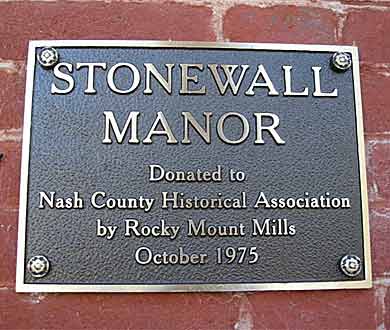
Stonewall takes its name from the heavy granite wall that borders the front lawn along U.S. 64 By-pass. The wall is composed of huge, roughly dressed blocks of irregular ashlar. The house is set in a superb oak grove. Built on the banks of the Tar River about 1830 by Bennett Bunn, Stonewall was the center of a large antebellum plantation. The Bunn family had been long established in Nash County before Bennett Bunn began the construction of his mansion. His earliest ancestor was David Bunn, who came to Edgecombe County, North Carolina, from Nansemond County, Virginia, in 1752. By the time of the Revolution, the Bunn family was a significant segment of the growing planter class in northeastern North Carolina. Born in the late 18th century, Bennett Bunn became one of the largest and most prosperous of the group. His earliest major acquisition was Quarter Plantation, which he inherited from his uncle Redman Bunn in 1809.
In 1814, Bennett Bunn inherited land from his father, Benjamin Bunn, on Stony Creek and the Tar River. On this land Stonewall was later built. During the next 15 years Bennett Bunn’s agricultural enterprises continued to grow. By 1830 he was one of the wealthiest planters in Nash County. The visible symbol of his affluence was Stonewall.
Stonewall’s scale and sophistication of design make it one of the truly elegant plantation houses of North Carolina. After Bennett Bunn’s death in 1849, Stonewall with its 126 acres, was purchased by another planter, and was then passed through the hands of several others before the abolition of slavery in 1868 which brought the plantation to a final turning-point. Most of the farmland was sold to pay the debts of its latest land owner. Its role as the focal point of a vast plantation was therefore effectively ended. It wasn’t until 1916, when the property was purchased by Rocky Mount Mills for $15,000 that renovations to this historical landmark began.
In 1975, the Nash County Historical Association, a non-profit organization dedicated to preserving and interpreting the history of Stonewall Manor, acquired a 30 year lease on Stonewall which has since been extended. After 5 years, the Manor was donated to the Nash County Historical Association which has since been reincorporated as "Friends of Stonewall Manor". Over the last 3 ½ decades, the association has been responsible for Stonewall’s dramatic restoration, and presently this brick mansion overlooking the Tar River is among the state’s finest restored antebellum homes. It remains the property of the Friends of Stonewall Manor and is managed by volunteers and a Board of Directors.
